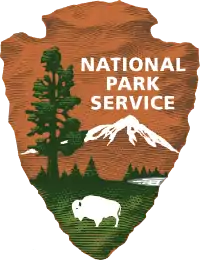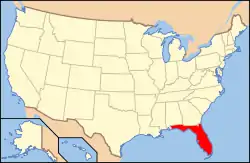Oaklawn Cemetery
Oaklawn Cemetery is the first public burial ground in Tampa, Florida, United States. The location was deeded in the mid-19th century and was described as the final resting place for "White and Slave, Rich and Poor". Oaklawn Cemetery is located at the intersection of Morgan Street and Harrison Street in downtown Tampa, about two blocks South of I-275. It has approximately 1,700 graves.
Oaklawn Cemetery | |
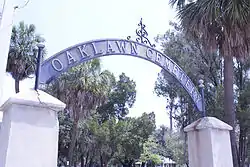 Harrison St. entrance to Oaklawn Cemetery | |
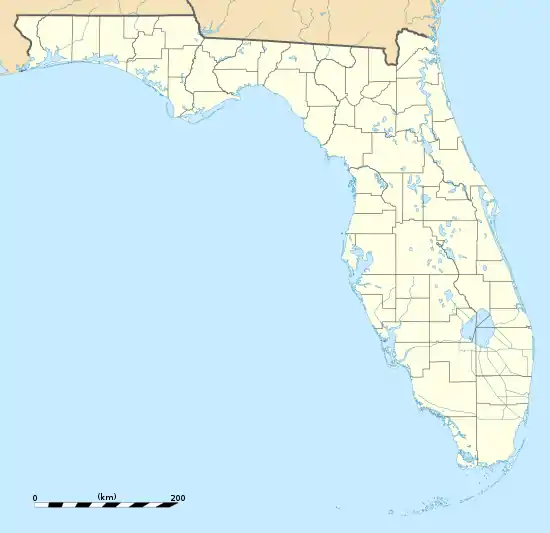  | |
| Location | Hillsborough County, Florida Tampa, Florida |
|---|---|
| Coordinates | 27°57′16.9″N 82°27′26.3″W |
| NRHP reference No. | 100001668 |
| Added to NRHP | September 19, 2017 |
Oaklawn Cemetery includes a section for Catholic burials called St. Louis Catholic Cemetery. The two graveyards were added as a Historic District to the U.S. National Register of Historic Places on September 19, 2017.[1] The Sexton House was used for equipment storage and maintenance activities. The cemetery was of the "Rural Cemetery" style.[2] The First Mayor of the City of Tampa, Judge Joseph B. Lancaster, is buried at Oaklawn, as is the 6th mayor, James McKay Sr. Others include pirates, slaves, yellow fever epidemic victims and confederate soldiers. Notable areas and gravesites in the cemetery include the gravesites of Henry Laurens Mitchell, John T. Lesley Family, Samuel Friebele, Charlie Wall, the Hooker Family, James McKay Jr., James C. Field, Joseph B. Lancaster, the Krause Family, the Wall Family, mass graves, gravesite of James T. Magbee, the gravesites of William and Nancy Ashley,[3] gravesites of John P. Wall, James Gettis,[4] grave art, and the "Cradle Graves".[5]
Saint Louis Catholic Cemetery
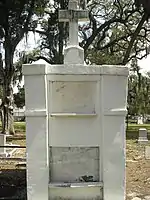
The northwest section is actually a separate cemetery known as Saint Louis Catholic Cemetery. Established in 1874, it had its own entry gates and was for many years completely separated from Oaklawn by an iron fence. Among those buried in the St. Louis section are the founder of Ybor City, Vicente Martinez Ybor, five pioneer priests (three of whom died in a 15-day period during the 1887 yellow fever epidemic) and Cecilia Morse, the foundress of Catholic parochial education in the Tampa Bay area. A few remnants of the fence are still visible including several brick fence posts with marble finials, the original driveways and the gates that serviced only the St. Louis section. In 2010 and 2011, the Diocese of Saint Petersburg added Catholic Heritage Markers to the cemetery recognizing the contributions of both Mrs. Morse and the pioneer priests, as well as a site map which delineates the "Saint Louis section" of the graveyard.[6][7]
Sexton House
The Sexton House, formerly known as the Pavilion or Gazebo, was constructed in 1910 for caretaker tools and equipment. The word "sexton" is from the Latin "sacristanus" which means "someone who looks after the sacred objects".[8]
Darwin Branch Givens
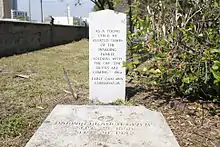
A gravesite for Darwin Branch Givens (born 1858 - died 1942) includes a marble marker at the gravesite inscribed:
- As a young
- child, he
- alerted Tampa
- of the
- invading
- Yankee
- soldiers with
- the cry "the
- devils are
- coming." 1864
- Early Oaklawn
- Conservator"[9]
Image gallery
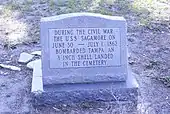 USS Sagamore marker
USS Sagamore marker Captain Black, Died at Sea
Captain Black, Died at Sea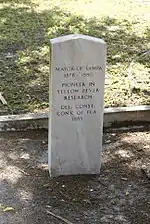 John P. Wall, 15th Mayor of Tampa
John P. Wall, 15th Mayor of Tampa 102 Unknown Monument
102 Unknown Monument Joseph Lancaster, First Mayor of Tampa, grave
Joseph Lancaster, First Mayor of Tampa, grave Kennedy Monument
Kennedy Monument Coller Marker, Tampa's First Settlers
Coller Marker, Tampa's First Settlers John McCormick, Tampa PD's first officer killed in the line of duty
John McCormick, Tampa PD's first officer killed in the line of duty Confederate Unknown Soldier
Confederate Unknown Soldier Pirate Grave
Pirate Grave Lesley Family Slave Grave, No name listed
Lesley Family Slave Grave, No name listed Yellow Fever Monument
Yellow Fever Monument Sgt John Miller, WWII
Sgt John Miller, WWII William and Nancy Ashley, Master and Servant grave
William and Nancy Ashley, Master and Servant grave
References
- "Federal Register Notices" (PDF).
- https://www.tampagov.net/parks-and-recreation/cemeteries/oaklawn-walking-tour-rural-cemetery
- "Tampa tombstone shares master, slave's tale of brave love". 2 February 2013.
- cotadmin (8 July 2014). "James Gettis".
- Oaklawn Walking Tour Archived 2013-06-23 at the Wayback Machine Tampa Parks and Recreation
- "C. Cecilia Morse Historical Marker".
- "Pioneer Priests' Graves Historical Marker".
- Sexton House Tampa Parks and Recreation
- "FPAN - Destination: Civil War - - Oaklawn Cemetery (4) - Darwin Givens grave and marker". www.flpublicarchaeology.org.
External links
| Wikimedia Commons has media related to Oaklawn Cemetery (Tampa, Florida). |
